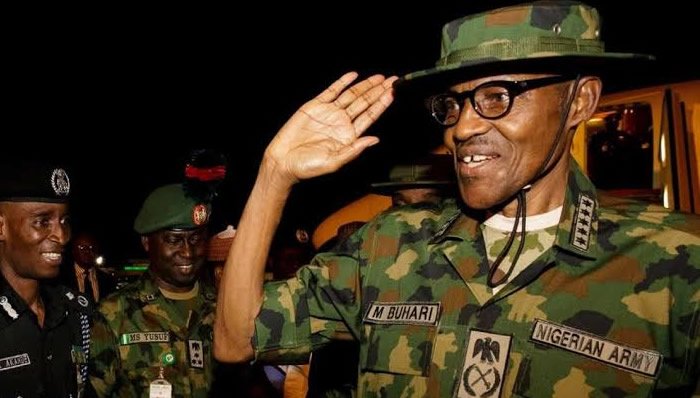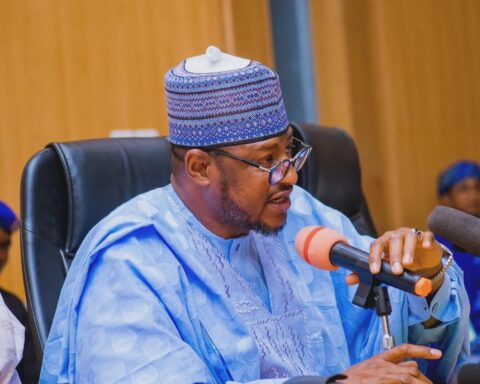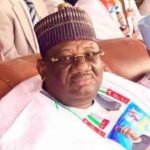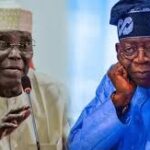MUHAMMADU Buhari, immediate past President of the Federal Republic of Nigeria, who died Sunday afternoon, 13 July 2025, was born on 17 December 1942, in Daura, Katsina State, the youngest of twenty-three children. He began his education at Mai’adua and Daura primary schools, continued to Katsina Middle School, and later attended Katsina Provincial Secondary School.
In 1961, at 19, he joined the Nigerian Military Training College and later trained at Mons Officer Cadet School in England. Over the next decade, he rose through the ranks, serving notably during the Nigerian Civil War (1967–1970), then advancing to brigade commander and brigade major roles. His military education included courses in Kaduna, Borden, United Kingdom, Wellington, India, and the US Army War College.
In 1975, following the Brigadier Murtala Mohammed coup that ousted General Yakubu Gowon, Buhari was appointed Governor of North-Eastern State (today’s Adamawa, Bauchi, Borno, Gombe, Taraba, and Yobe States).
He briefly held that post and then served under General Olusegun Obasanjo as Commissioner, as Ministers were then known, for Petroleum and Natural Resources and later as Board Chairman of the newly formed Nigerian National Petroleum Corporation, NNPC.
In December 1983, he led a coup that removed President Shehu Shagari and became Head of State. Buhari launched a strict anti-corruption campaign “War Against Indiscipline”, and by decree, froze bank accounts and sanctioned trials for politicians and public officials some of who landed jail terms of over 100 years
Critics highlighted human rights abuses, including press censorship, under Tunde Thompson and Nduka Irabor were jailed, and National Security Organisation crackdowns, anda botched 1984 plot to kidnap opposition figure Umaru Dikko in London.
The “53 suitcases” scandal involving customs clearance of luggage that were suspected to be filled with illegal items was an instance when orders from the regime was used to break the law. His regime was toppled in August 1985 by General Ibrahim Babangida.
Twenty-eight years later, Buhari returned to partisan politics, contesting the presidency unsuccessfully in 2003, 2007, and 2011. He finally won in 2015 under the All Progressives Congress, defeating incumbent Goodluck Jonathan, the first democratic transfer of power from an incumbent in Nigeria.
Praised for his anti-corruption stance, he inherited Nigeria amid falling oil prices, Boko Haram insurgency, unemployment, and public distrust.
His administration focused on anti-corruption through EFCC-led prosecutions of judges, military figures, and officials like former Attorney-General of the Federation Mohammed Adoke. Despite 603 convictions by 2018, critics accused him of selective prosecution, pardon controversies involving former Governors, and tolerating corruption within his ranks, including allegations against advisers like Babachir Lawal and Abba Kyari.
His economic policies bowed to a recession under falling oil prices, an ill-fated naira re-design that triggered widespread hardship, and a 288 percent rise in national debt. His penchant for borrowing was a mark of the administration.
Boko Haram seemed to have regained grounds during his administration. Military operations and a regional coalition were not effective. Violence spread, with over 63,000 deaths from insurgency and banditry between 2015 and 2023.
Security remained a major challenge as insurgents infiltrated new regions, provoking criticism that his government had failed to protect citizens. In 2020, his re-introduction of the War Against Indiscipline drew controversy over militarised enforcement. That same year, the #EndSARS protests erupted over police brutality, ending with deadly state-led crackdowns amidst public outrage.
Buhari’s health became a recurring concern after months-long stays in Britain between 2017 and 2018 for an undisclosed illness. Speculation intensified during his extended absences, prompting fears of leadership vacuums. He returned for a second term in 2019 in a contentious election marked by allegations of righing and violence.
Bola Ahmed Tinubu succeeded him on 29 May 2023.
Buhari passed away in London, aged 82 after a prolonged illness. His death marks the end of a life woven with military authority, anti-corruption activism, democratic evolution, and controversies over human rights, governance, and policy outcomes.
His legacy reflects a path marked by discipline, intolerance, hope, firmness, and indeterminate stance in Nigeria’s quest for stability and integrity.



























